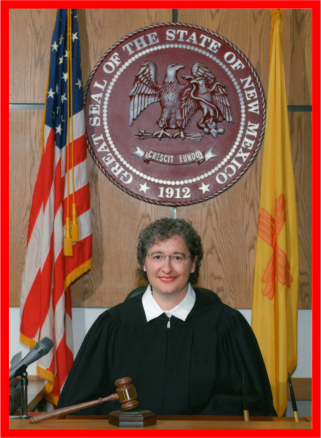During her tenure at the Third Judicial District Court, Judge Lisa Schultz has initiated many positive changes for her court. Here are just some of her accomplishments.
 Judge Schultz is the Presiding Judge over the “Assisted Outpatient Treatment Program” (AOT), helping to assist severely mentally ill persons in our community. The AOT team brings together a wide array of persons and services to provide an encompassing treatment program, including services for mental and physical health, as well as Judicial Services. The program also helps people move from homelessness to stable residencies, and where appropriate, employment. Dona Ana County successfully applied for and obtained one of only seventeen pilot grants in the United States to implement the first AOT program in New Mexico.
Judge Schultz is the Presiding Judge over the “Assisted Outpatient Treatment Program” (AOT), helping to assist severely mentally ill persons in our community. The AOT team brings together a wide array of persons and services to provide an encompassing treatment program, including services for mental and physical health, as well as Judicial Services. The program also helps people move from homelessness to stable residencies, and where appropriate, employment. Dona Ana County successfully applied for and obtained one of only seventeen pilot grants in the United States to implement the first AOT program in New Mexico.
Recently, Judge Schultz was certified as the first judge in New Mexico to be a Trauma Informed Trainer which allows her to teach other judges how to provide more appropriate judicial services to those persons who suffer from mental illness.
Judge Schultz was the first judge in her district to “unshackle” the children in court. Prior to Judge Schultz’ tenure on the bench, children were brought into court shackled at the wrists, waist and ankles. Shortly after Judge Schultz’ controversial decision, a court wide policy was issued to shackle the children. Thereafter, the New Mexico Supreme Court received a Writ requesting that all Judges in our court be ordered to unshackle the children. Now, all children in the District receive an individualized assessment of dangerousness. If they are not dangerous, then they are not shackled.
Schultz initiated the successful discussion to have female, as well as male, security guards in Court.
Judge Schultz developed and provided sensitivity training for her Juvenile Drug Court Staff.
Lisa worked, providing many volunteer hours, in the South Valley to strengthen the Anthony, NM Juvenile Drug Court. During her tenure as a Children’s Court Judge, presiding over three juvenile Drug Courts, she helped many teenagers go “clean and sober,” return to high school and graduate — with some participants continuing on to college.
Judge Schultz developed and implemented “best practices” for dealing with LGBT youth in Juvenile Drug Court.
Schultz brought a new focus on the best interests of the children to family resolutions in Divorce Court. Judge Schultz says: “Most parents love their children but they bring to me the long-standing and deep-seated frustrations of a divorcing couple. These issues need to be dealt with to remove the tension between the parents. During this process, I help the parents focus on their child’s best interests. Sometimes, they lose sight of that simple fact. It’s my job to remind them and help them to a place of family peace. It’s always the children who benefit when the parents can develop a good co-parenting relationship.”
Schultz was the judge who disclosed the allegations against a fellow judge of pay-to-play activity. Judge Schultz represented the interests of the community by serving as a witness for two and ½ years in this case. Ultimately, that judge was convicted of criminal behavior.
Judge Schultz helped establish law by making decisions that were upheld on appeal. A review of the high Courts’ final opinions concerning her cases during the years considered by the judicial performance evaluation commission, for both the 2014 and 2020 elections, revealed a 100% success rate – all of her decisions were upheld.
 Judge Schultz is the Presiding Judge over the “Assisted Outpatient Treatment Program” (AOT), helping to assist severely mentally ill persons in our community. The AOT team brings together a wide array of persons and services to provide an encompassing treatment program, including services for mental and physical health, as well as Judicial Services. The program also helps people move from homelessness to stable residencies, and where appropriate, employment. Dona Ana County successfully applied for and obtained one of only seventeen pilot grants in the United States to implement the first AOT program in New Mexico.
Judge Schultz is the Presiding Judge over the “Assisted Outpatient Treatment Program” (AOT), helping to assist severely mentally ill persons in our community. The AOT team brings together a wide array of persons and services to provide an encompassing treatment program, including services for mental and physical health, as well as Judicial Services. The program also helps people move from homelessness to stable residencies, and where appropriate, employment. Dona Ana County successfully applied for and obtained one of only seventeen pilot grants in the United States to implement the first AOT program in New Mexico.